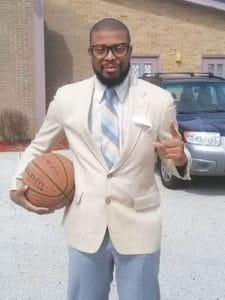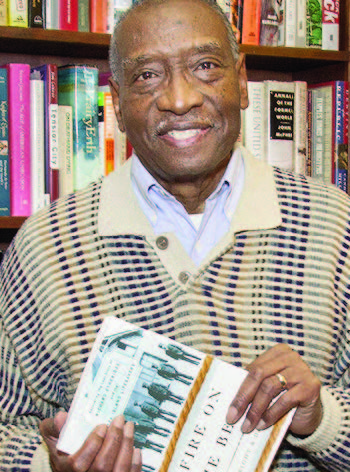By Joseph G. Phillips
As a civil rights leader, military veteran, sports enthusiast, educator and advocate for social justice, Hyde Park resident Dr. James W. Johnson has impacted many lives throughout his illustrious career.
A former athlete at Dunbar High School during the 50s, and now a retired professor of history from the University of Alabama A&M, Johnson has influenced students, athletes, politicians, dignitaries, ministers and a host of other prominent individuals throughout his lifetime.
“I served as a private in the U.S. Army from 1957 to 1959,” Johnson said. “The Korean War had ended but the draft continued. I was drafted in 1957 and served a two-year tour of duty in the Panama Canal Zone where the Army trained me as a medic and x-ray technician.”
With a strong background in history, Johnson was credited as a pioneer in the South, for launching and spearheading the “Buffalo Soldiers” exhibit project in 1995.
The project was a historical exhibit that was once displayed in the James H. Wilson Hall at the University of Alabama A&M Black Archives Research Center and Museum in Huntsville, AL during the 90s.
“As a tribute to the soldiers, I wanted to create a permanent exhibit for the Black Archives Research Center,” Johnson said. “I served as director of the museum (during the time) and had a hand in obtaining national historic landmark status for Alabama A&M University’s James H. Wilson building.”
The exhibit was dedicated to the 10th Calvary Regiment, a group of all Black soldiers who were dubbed “Buffalo Soldiers” by Native Americans during the Indian Wars of the late 1800s. The group was also known for its combat in the Spanish American War, the Philippine-American War, the Mexican Expedition, World War I, World War II, the Vietnam War, the Iraq War and the Afghanistan War, making a strong impact throughout history.
When asked how the military impacted his life, Johnson shared his struggles, his journey and his solutions on how he dealt with racism as a soldier.
“Traveling to U.S. Army bases for training and to Panama, changed my world-view,” Johnson said. “I was able to gain a better understanding of politics and history. I grew up in Chicago. While traveling with the Army from Ft. Leonard Wood, MO, to Ft. Polk, LA, one day our bus stopped at a restaurant [in the South] with a sign saying ‘Colored Eat in Back.’ I did not go into the restaurant. I got sick to my stomach.”
Johnson said that he and his wife also experienced racism while he was stationed in Panama during the pre- Civil Rights era. While applying for a house outside of the military base, a real estate agent rejected Johnson and his wife immediately and told them that the property they were look- ing to purchase was “already sold to a white couple,” Johnson said. They were also told that Blacks were not allowed to live in the area due to previous segregation housing laws ( in spite of President Harry Truman lifting the ban on housing segregation during the 50s).
”After my service ended, the Civil Rights movement was kicking into gear,” Johnson said. “I became attuned to history and politics. I later used the GI Bill to fund my graduate level studies in African American history.
After the incident, Johnson decid- ed to support his family by working as a technician in the medical field and an agent in real estate property management while earning a bachelor’s degree from Chicago State University. He also earned a master’s degree and a doctorate from the Univer- sity of Missouri-Columbia, focusing on African American Studies. One of his first scholarly articles analyzed the role of America’s Black press in covering and shaping national and international politics.
As a staunch advocate for historical preservation and a well-respected
authoritarian in African American history, Johnson, a Fulbright Scholar, would go on to teach at the University of Maiduguri in Nigeria while participating in studies in Ghana, where he expanded his understanding in Afri- can culture and traditional religions in addition to traveling to Senegal, Liberia and Sierra Leone in his lifetime.
Since August of 2009, Johnson now 84, has lived at a residence for senior citizens in Hyde Park, where he currently commits to helping others.

Joseph Phillips is the Sports Editor for the Chicago Crusader Newspaper. He is a Chicago native, who has been a sports writer for over 17 years. He also hosts the SC Media News and Sports Network Q&A radio show on WHPK 88.5 FM Chicago. He can be reached at [email protected].
Joseph Phillips is the Sports Editor for the Chicago Crusader Newspaper. He is a Chicago native, who has been a sports writer for over 17 years. He also hosts the SC Media News and Sports Network Q&A radio show on WHPK 88.5 FM Chicago.
-
Joseph Phillipshttps://chicagocrusader.com/author/joseph-phillips/
-
Joseph Phillipshttps://chicagocrusader.com/author/joseph-phillips/
-
Joseph Phillipshttps://chicagocrusader.com/author/joseph-phillips/
-
Joseph Phillipshttps://chicagocrusader.com/author/joseph-phillips/







